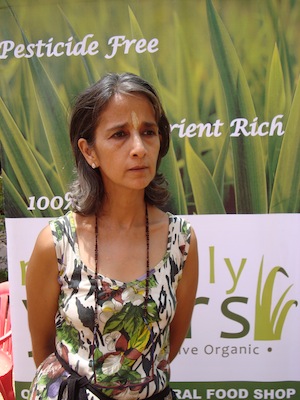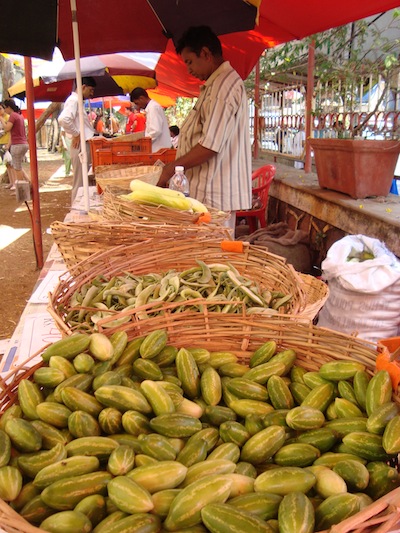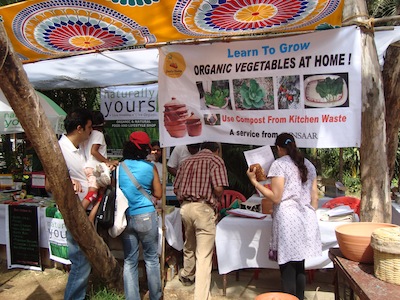On this spring equinox Sunday 2010, the Farmers’ Market was launched at Nilgiri Garden, in Bandra, one of the busiest shopping areas of this wealthy suburb of Mumbai. It was a great success as after a few hours there were no fruits or vegetables left. The farmers from Maharashtra were satisfied by their day and ready to come back every week.
Behind this great idea stands the energetic Kavita MUKHI who has spent the last twenty years promoting healthy, natural and organic food as part of a way of living that respects both human beings and Mother Earth.

Kavita Mukhi
Kavita Mukhi, trained in journalism and nutrition, is a well-known figure of the engaged circles of Mumbai metropolis. She founded Conscious Food, a brand of natural food products, and is a member of La Leche League Internationale. As she became closer to the farmers’ world she decided to start her own farm in Alibag (Maharashtra) and to launch the first ever Farmers’ Market of Mumbai in order to support small farmers who are into organic farming, using no pesticides nor chemical fertilizers, and whom she considers as the real scientists of India.
In this interview she freely and passionately tells us about the different stages of her own journey towards organic farming and she shows how important is the link and interaction between urban and rural areas of India.
Kavita, how did you get involved into natural and organic farming?
My parents are from Pakistan, Hyderabad in Sindh Province. After Partition they came to India and I was born in Bombay. But when my grand-father left Pakistan he got land in Uttar Pradesh. So I was on a farm during the first six years of my life, so for me being on a farm is the most natural thing. And my maternal grand-father was in the retail business. I have always been very tempted to do retail because you meet the customers, this is why the Farmers’ Market is so excellent. And my paternal grand-father was a Minister of Health at one point and Minister of Agriculture at another time, so it’s like written!
I was born into a family where people didn’t really run to doctors. My grand-mother, whom I lived with for 35 years, was somebody who never wasted. She would save every little piece of clothes from the tailor, from which she would make blankets. Or she would take our old exercise book and instead of throwing them away she would cut them into strips, string it together with a needle, and used them to light one gas to another so that she didn’t waste a match stick. As I grew I realized her wealth, just as now I’m realizing the farmers’ wealth.
Then, I got married and I had a baby. I started to breast feed him but he was very cranky. Some people told me: “Stop breastfeeding”. Luckily an aunt had brought from America a book called “The Womanly art of breast feeding” which is a La Leche League Internationale’s book which says that no baby can be allergic to mother’s milk. And another nutrition book, which has been in my house for years, fell on my lap, and it said that animal milk is not natural to human beings. So I stopped drinking milk and my child was fine. He began to nurse like a new born baby, he automatically stopped sucking his thumb and his stomach stopped irritating him. So something so small, so simple, made me feel that food is everything! Actually I became overconfident and now, after many years, I know that food is just a part of our well-being and there are many other things including your relationships with people, love, etc. that make you feel healthy and happy.
Then I started the Bombay College of Health and Nutrition. Twenty five years ago, it was very new! I started my own shop called Kavita Mukhi’s Health Shop in 1990: a little hundred square foot shop on Malabar Hill. It became Conscious Food in 1999. I sold it as Conscious Food in 2001 (for my son education); I am now a consultant as eco-nutritionist.
At that time, in the nineties, I was part of an organization called Prakriti (“nature”) which doesn’t exist anymore. We had a conference on “natural farming”, a first one of its kind in Maharashtra, and I got involved with this whole concept (read the article on natural farming). We were also the first people to invite to India Masanobu Fukuoka, the famous Japanese natural farmer who wrote “The One-Straw Revolution” (read the article). That’s when I started to convert my shop as much as possible into organic food shop. We would not sell just brown rice but organic brown rice. At Conscious Food, we are the only company which doesn’t sell refined food.
At this natural conference I met a lot of farmers who had a real knowledge on every thing. You don’t have to teach them anything. Actually there are many organic farmers in India so it’s not a problem to get organic products. But it’s a question of how to manage. And there is a price to pay: will the customer pay that price? That is the problem, nothing else.
Why is organic food more expensive?
The food and vegetables are not more expensive unless farmers pay for certification. Then they tend to add that price. Earlier certification was much more expensive, now it has come down so the prices are not so much expensive as you can see at the Farmers’ Market. And we shall not forget that they are spending two days coming and going.
Anyway, what are we talking about? The world has gone crazy! The right price is actually much higher. Today in India the food is subsidized by the Government so that the poor man can eat. But the farmer cannot survive with that price. The middle man buys it for 2 or 3 rupees a kilo. It’s very tragic.
With inflation, dal (lentils), which is a common man’s food, has gone up to 80, 90, 100 rupees a kilo so it’s not that organic prices have gone down, but those other prices have gone up. So people are not finding so different now. Organic prices remain because that is the right price of food. It is the price that every body needs to pay and the government needs to subsidize it only for the poor.
Because, frankly, what is the right price? I can buy this dupatta (1) a hundred rupees, I can buy a better one for 200, or 300, I don’t question that. But for food we will question, even though it is not adulterated, nobody has mixed dangerous powder in it, it’s clean, it’s not going in some dirty market where dirty hands touch it.
In Conscious Food, by the time it comes to our workshop it gets cleaned, preserved without any chemicals, packaged. Then we sell it to retailers who take 30% margin. Without pesticides organic food also spoils faster. So we have to take all that into account, otherwise nobody will survive in business.
How does the Farmers’ Market work?
All the twenty farmers who come and sell their products at the Farmers’ Market are members of a cooperative called Organic Farms run by Ashish Shinde whom I met at an EcoCert conference. It is based in Maharashtra and has more than one thousand farmers. We want to get more farmers involved and get a greater range of products.
It works because it is a group; if I had to contact 500 farmers separately it will never work. They organize it amongst themselves and I’m dealing with one person only. So it has been quite easy in that sense. It took us only a few months to organize the Market. The whole group is certified by EcoCert which is an international certifying agency based in France.

Organic green vegetables sold at the Farmers’ Market in Bandra, Mumbai
This is not a non-profit because setting up a non-profit organization is a big headache. So we have decided to set it up as an association of people. Even the farmers’ groups can be part of it. To run the Market we have to pay the rent of the garden, the tables, the banners, etc. In a month it costs us 25.000 rupees. And we did some advertising, including an advertisement on 20 black and yellow taxi cabs for one and half month, mailers, that cost about 70.000 rupees.
For the Market we charge only stalls that we call our ‘sponsors’ and who sell organic and earth-friendly manufactured or packaged products. We don’t charge the farmers who come with fresh products. And we don’t give competition to rural farmers: if a city farmer who has a business and a farm and wants to sell the same fresh products as the rural farmers we don’t let him because then everybody starts undercutting. But if the rural farmer is doing a business of packaged goods like ghee, then we charge them. But that is also very minimal, like a thousand rupees.
What were your motivations in starting this Market in which you spend so much energy, time and also money?
In a sense, my motivation has always been very selfish: I wanted safe food! I can’t ask a farmer to send me two kilos of potatoes every week… so I organized a huge market so that every body gets it! When I tasted these figs… It tasted like God food, and I thought that actually the food is meant to taste like this! We have got so used to chemical food that we don’t know the real taste. And the genetically modified issue, especially brinjal, was also a key element in my decision.
The way people come and say ‘Thank you!’… It’s a great satisfaction and it shows that we created something where there is a need for it. But Bombay is huge; we can do a lot more. From October 3rd, we are planning to have per month two markets in Bandra, one in Powai (North of Mumbai), and one in Cuffe Parade (South Mumbai). We have to get people hooked on it like the Bandra people who cannot do without it anymore! But young people have to take it on; right now I’m doing a lot of things.

Organic farming clears a path through urban life
What changes have you witnessed in the past twenty years regarding organic products?
Actually, I’m so disappointed because it’s the same bunch of people who came twenty years ago to my shop and come now to the Market. Ok, maybe it’s gone up by hundred percent but it’s still small. Where are the people in this big city? We have 1700 members on Facebook, Hindustan Times published an article that announced the opening of the Market, but people don’t come…
The EcoCert head in India has told this Marathi saying: “In the good old days the farmer’s most intelligent son would become a farmer, next less intelligent would get into some business and the least intelligent would get a job.” Now the farmer’s most stupid child only becomes a farmer. This is the tragedy in India.
When I sold Conscious Food I had some time, and I get a farm in Alibag (Maharashtra). I started to farm and I realized even more the worth of the farmers. These are the scientists of our country and we are an agricultural country. And what are we doing? We’re pushing them into a corner, into debt and suicide so their children don’t want to be farmers. Those farmers are committing suicide because, in this country, the rich get richer and the poor get poorer. India is such a wealthy, such a beautiful country, and yet when you look at the street does it look as a rich country? You are in Mumbai, the business capital of India, and yet it looks like a poverty ridden place with beggars and slums! And the way people have to live! In the city one person in each house cannot go to work because they have to be at home to fill water. And yet people like us will have three bathrooms. It’s so shocking! But no politicians think like this.
If we, city people, are going to villages and if we don’t act like stupid city people and the villagers see that we are eating non polished rice, that we are just going back to old things then they will also go back to these practices and cultures. For example, I grow vegetables and rice on my three acres. The farmers there have seen that my neighbor put chemicals, I didn’t, and when the wind came, his crop fell and mine did not.
This Sunday there was a boy, the son of one of the farmers who came to sell his fresh products, he was playing on the swing. I told him: “You please learn farming from your father, and then please teach me!” Maybe if he hears that from somebody like us from the city he’ll really feel that there must be something in this and get interested in it. The next generation has to be farmers otherwise we’ll have no food on our plate. What are we going to eat? Money?
Palabras claves
agricultura orgánica, agricultura campesina, comercialización de productos agrícolas y alimenticios, relación campo ciudad
, India
Notas
Valerie FERNANDO interviewed Kavita MUKHI in Mumbai (India) on May 11, 2010.
This interview is also available in French: Kavita Mukhi, pionnière du commerce alimentaire bio en Inde
For more information:
-
The Farmers’ Market group on Facebook
-
The natural and organic food brand’s site Conscious Food
-
Kavita Mukhi‘s personal site
Fuente
Entrevista

RITIMO (Réseau d’information et de documentation pour le développement durable et la solidarité internationale) - 21 ter rue Voltaire, 75011 Paris, FRANCE - Tél. 33(0) 1 44 64 74 14 - Fax : 33(0) 1 44 64 74 55 - Francia - www.ritimo.org et www.rinoceros.org - dph (@) ritimo.org



